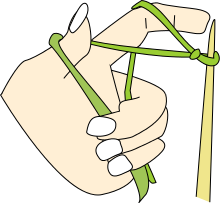

In knitting, casting on is a family of techniques for adding new stitches that do not depend on earlier stitches, i.e., having an independent lower edge. In principle, it is the opposite of binding off, but the techniques involved are generally unrelated.
The cast-on can also be decorated with various stitch patterns, especially picots. The cast-on stitches can also be twisted clockwise or counterclockwise as they are added to the needle; this is commonly done for the single cast-on described below to give it a neater, more uniform look.
Casting on is sometimes done with doubled-up needles or a needle of larger size than for the main pattern; the extra bit of yarn in each stitch makes the edge less tight and gives it more flexibility.
When casting on at the beginning, one end of the yarn is usually secured to the knitting needle by knotting it, typically with a slip knot. This knot is unnecessary when casting on in the middle of the fabric (e.g., when making the upper edge of a buttonhole) since the yarn is already secured to the fabric. The original slip knot can be pulled out after a few rows have been knitted without damaging the knitted fabric. It is also possible to cast on using a simple twisted loop.
Once one loop has been secured around the needle, or if it is already secured to the fabric, there are several different methods for adding others.